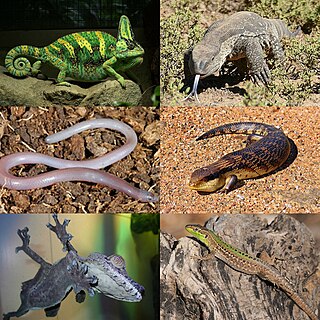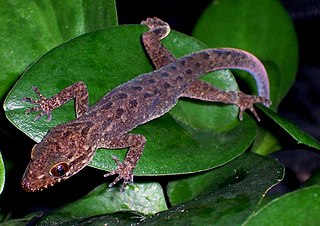
Geckos are small lizards belonging to the infraorder Gekkota, found in warm climates throughout the world. They range from 1.6 to 60 cm.

Lizards are a widespread group of squamate reptiles, with over 6,000 species, ranging across all continents except Antarctica, as well as most oceanic island chains. The group is paraphyletic as it excludes the snakes and Amphisbaenia; some lizards are more closely related to these two excluded groups than they are to other lizards. Lizards range in size from chameleons and geckos a few centimeters long to the 3 meter long Komodo dragon.

Phelsuma is a large genus of geckos in the family Gekkonidae. Species in the genus Phelsuma are commonly referred to as day geckos.

Gekkonidae is the largest family of geckos, containing over 950 described species in 64 genera. Members of the Gekkonidae comprise many of the most widespread gecko species, including house geckos (Hemidactylus), tokay geckos (Gekko), day geckos (Phelsuma), mourning geckos (Lepidodactylus) and dtellas (Gehyra). Gekkonid geckos occur globally and are particularly species-rich in tropical areas.

Gekko is a genus of Southeast Asian geckos, commonly known as true geckos or calling geckos, in the family Gekkonidae. Although species such as Gekko gecko are very widespread and common, some species in the same genus have a very small range and are considered rare or endangered. Fossils, including Yantarogekko, date back to the Eocene.

Gonatodes is a genus of New World dwarf geckos of the family Sphaerodactylidae.

Hemidactylus is a genus of the common gecko family, Gekkonidae. It has 174 described species, newfound ones being described every few years. These geckos are found in all the tropical regions of the world, extending into the subtropical parts of Africa and Europe. They excel in colonizing oceanic islands by rafting on flotsam, and are for example found across most of Polynesia. In some archipelagoes, cryptic species complexes are found. Geckos like to live in and out of houses. They have been introduced to Australia.

Bunopus is a genus of small geckos, lizards in the family Gekkonidae. The genus is endemic to the Middle East.

Cnemaspis is a genus of diurnal (day) geckos found in Africa and Asia. With over 100 species, it is one of the most diverse genera of geckos. Molecular phylogenies suggest that the three regional groupings may form distinct clades which are not each other's closest relatives.

Cyrtodactylus is a diverse genus of Asian geckos, commonly known as bent-toed geckos, bow-fingered geckos, and forest geckos. The genus has at least 300 described species as of 2020, which makes it the largest of all gecko genera.
In biology, setae are any of a number of different bristle- or hair-like structures on living organisms.

The common flat-tail gecko is a gecko endemic to Madagascar. It is found in eastern Madagascar and on the islands Nosy Bohara and Nosy Mangabe. These geckos live in tropical rain forests. They reach a total length of 330 mm.

Gekko gecko, the tokay gecko, is a crepuscular arboreal gecko in the genus Gekko, the true geckos. It is native to Asia and some Pacific Islands.

The common house gecko, is a gecko native to Southeast Asia. It is also known as the Asian house gecko, Pacific house gecko, wall gecko, house lizard, or moon lizard.

The gecko catshark is a species of catshark, part of the family Scyliorhinidae, native to the northwestern Pacific Ocean from southern Japan to Taiwan, and possibly also off Vietnam. It is a common, demersal species found at depths of 100–900 m (330–2,950 ft). Its body is slender, with a pattern of dark saddles and blotches. The dorsal and caudal fins are edged in white, and there is a prominent crest of enlarged dermal denticles along the dorsal edge of the caudal fin. The gecko catshark is a schooling, opportunistic predator of bony fishes, cephalopods, and crustaceans. It is oviparous, with females producing two vase-shaped egg capsules at a time. This species is captured as bycatch, but does not appear to be threatened by fishery activities at present and has been assessed as Least Concern by the International Union for Conservation of Nature (IUCN).

The Eublepharidae are a family of geckos (Gekkota) consisting of 30 described species in six genera. They occur in Asia, Africa and North America. Eublepharid geckos lack adhesive toepads and, unlike other geckos, have movable eyelids, thus commonly called eyelid geckos. Leopard geckos and African fat-tailed geckos are popular pet lizards.

The Sphaerodactylidae are a family of geckos (Gekkota) distributed in North America, Central America, South America, and the Caribbean, as well as in Southern Europe, North Africa, the Middle East, and into Central Asia. Over 200 species are described in the several genera in this family.
The banded ground gecko is a gecko endemic to Japan.
Trachydactylus is a genus of geckos from the Middle East.
Trachydactylus hajarensis, the spacious rock gecko or banded ground gecko, is a species of lizard in the family Gekkonidae. It is found in Oman and the United Arab Emirates.

















